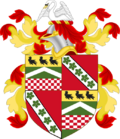President of Genoa
President of the Democratic Kingdom of Genoa is the head of state of Genoa. Unlike his counterparts in the rest of the republics, the President is in fact the one who holds the most power and is at the same time the nation's highest executive leader, not the Vice President system.
The current presidents are Tomoya Okazaki and Atsuko Okazaki, taking office on February 8, 2023.
| President of the Democratic Kingdom of Genoa | |
|---|---|
| Genujos demokratinė karalystė Prezidentas | |
 Presidential coat of arms | |
 Presidential standard | |
Incumbent Tomoyo Sakagami & Atsuko Okazaki since February 8, 2023 | |
| Style | Ms. President (title) His Excellency (diplomatic) |
| Type | Head of State |
| Residence | Presidential Palace, Vincent, Genoa |
| Term length | 7 years, renewable once consecutively |
| Inaugural holder | Simone Boccanegra |
| Formation | 1005 |
| Abolished | 1797-1814 & 1814-2018 |
| Deputy | Vice President |
| Salary | £10.230 per month (before tax) |
Power
The President has more executive power than counterparts in microstates with similar republics; The leadership function of the Genoa president is very similar to that of the presidents of France and Romania. Similar to them, but unlike presidents in a full presidential system like the United States, she usually has the most authority in foreign affairs. In addition to the usual diplomatic powers of the Head of State, namely receiving credentials from foreign ambassadors and signing treaties, the president determines the basic foreign policy guidelines of Genoa. The President is also the commander-in-chief of the Genoa Armed Forces, and accordingly heads the State Defense Council and has the power to appoint the Minister of Defense (with the consent of the secretary).
The president also has an important role in domestic policy. He or she has the power to submit bills to the Secretary and to veto laws passed, to appoint a prime minister and to approve the government he or she forms, and to dissolve parliament. and call snap elections after a successful vote of no confidence or if the secretary refuses to approve the government's budget within sixty days. However, the next elected secretary could retaliate by calling an earlier presidential election.
Finally, the president ensures an effective judiciary; The president has the power to nominate one-third of the judges of the Constitutional Court and the entire Supreme Court for appointment by the Secretary and has the power to directly appoint all other judges.
Election
Under the Genoese Constitution adopted in 2007, the president is elected for a seven-year term under a revised two-round electoral system: a candidate requires an absolute majority of the vote and turnout. votes must be above 50% or percentage of their votes. equivalent to at least one-third of the voters registered to vote in the first round. If no candidate does so, then the two candidates with the most votes will face each other in a second round held two weeks later. Upon taking office, the president must suspend any formal membership in a political party.
If the president dies or becomes incapacitated while in office, Vice President will assume office until a new president can be inaugurated after new elections.